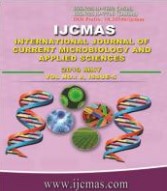


 National Academy of Agricultural Sciences (NAAS)
National Academy of Agricultural Sciences (NAAS)

|
PRINT ISSN : 2319-7692
Online ISSN : 2319-7706 Issues : 12 per year Publisher : Excellent Publishers Email : editorijcmas@gmail.com / submit@ijcmas.com Editor-in-chief: Dr.M.Prakash Index Copernicus ICV 2018: 95.39 NAAS RATING 2020: 5.38 |
Increased productivity of dry chilli with appreciable fruit quality is the present need in major growing areas to promote export from our country. The present investigation was undertaken to identify important selection indices, and to analyze the genetic divergence of collected germplasm for identification of diverse parents for spice chilli hybridization program. Different components of genetic variability for 15 growth and yield component traits were determined employing 45 genotypes evaluated in autumn-winter season of 2015-16 in Randomized Block Design with three replications. High GCV and PCV values were recorded for all the characters except days to 50% flowering, days to ripe fruit maturity from anthesis and 1000 seed weight. The proportion of genetic contribution to the overall phenotypic expression of most of the traits was very high. Both heritability and genetic advance was high for all the characters under study except days to ripe fruit maturity from anthesis, revealing additive genetic control of characters. Selection would be most useful for the improvement of these traits. Dry fruit yield/plant was found positively and significantly correlated with all the traits except days to 50% flowering and days to ripe fruit maturity from anthesis. Path coefficient analysis indicated that the maximum direct effect on dry fruit yield/plant was through ripe fruit yield/plant followed by dry fruit weight. From the combing study of correlation and path coefficient, the characters, namely ripe fruit yield/plant and dry fruit weight were the most important selection criteria, emphasis should be given on such traits while imposing selection for amenability in dry fruit yield of chilli. Based on the determination of divergence all the genotypes were grouped into 7 clusters. However, random grouping pattern of genotypes was observed indicating that geographical diversity and genetic divergence were unrelated. The intra- and inter-cluster distance among the genotypes depicted that crossing between the genotypes belonging in Cluster I and VII or Cluster III and VII will be expected to give high heterotic response in F1 generation. The character fruit length contributed the maximum towards genetic divergence followed by fruit diameter, fruits/plant and plant spread (N-S). Based on D2 Statistics, PCA and mean performance, six genitors Beldanga, BCCH Sel-4, G-4, BCC-30, BCC-25, and Srinagar possessed the optimum combination of all variables and were identified as most promising donor parents in dry chilli hybridization programme with a view to develop promising hybrids/improved lines.
 |
 |
 |
 |
 |